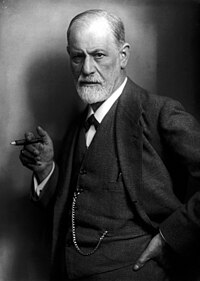 Sigmund Freud(1856-1939), was an Austrian born neurologist who is known today as the father of Psychoanalysis. Due to the impact of Freudian theory, Sigmund Freud is consistently ranked as one of the most influential people in western history.
Sigmund Freud(1856-1939), was an Austrian born neurologist who is known today as the father of Psychoanalysis. Due to the impact of Freudian theory, Sigmund Freud is consistently ranked as one of the most influential people in western history.Freud saw the mind as being divided into three parts each of which comes about during the childhood development and operates on a different principle:
- The id, being the only part of the mind present at birth, unconsciously operates on the pleasure principle.Which states, that people intrinsically seek pleasure and avoid pain. Thus the unconscious drive of the id is to seek out pleasure while simultaneously avoiding pain.
- The ego comes about shortly after birth as a method of managing the needs of the id. The ego contains the conscious aspect of the mind and operates on the reality principle; the principle that instant gratification for ones needs is not always possible, and that in some cases instant gratification for ones needs is a less desirable outcome than other possible longterm outcomes.
- The superego arises later in childhood development and is consistent with the realization that one is not the center of reality and all attention and that other beings also have needs. The superego aims for perfection and stands in opposition to the id; where the id seeks personal gratification, the superego seeks socially acceptable behavior. The superego functions through a system of reward and punishment of the consciousness; in thoughts or behavior which the superego deems constructive toward perfection/social acceptability, the superego rewards the id with positive/pleasurable feelings, such as happiness and love. Contrary, thoughts and behaviors which are destructive to the superego's goals are punished with negative/painful feelings, such as guilt and remorse.
Freud describes much of abnormal psychology do be the result of an imbalance of, or in extreme cases absence of, one of the three divisions of the mind. Freud's psychoanalytic theory also includes a more detailed developmental theory, in which he describes human development through to adulthood. In his theory of Psychosexual Development, Freud describes humans as having an instinctive sexual apatite, which he labels the libido. Freud identifies 5 phases of development, each of which is characterized both by a differing erogenous zone through which the individual derives sexual pleasure and different life conflicts. These stages are:
- Oral Phase - Lasting from birth to around two years of age. The individual derives pleasure from the mouth; breast feeding is a primary source of pleasure, in addition, infants tend to identify new objects by placing them in and around their mouth. All actions during this phase are based on the pleasure principle, as the ego and superego are not yet fully developed. During this stage the ego is formed as the infant begins to realize a distinction between their own body and the external world, and begin to realize and manipulate the delay of gratification. This stage is characterized by the conflict between dependence and independence.
- Anal Phase - Lasts from roughly 15+ months to 3 years of age. During this stage the erogenous zones shift from the mouth to the lower digestive tract and anus. Across cultures, toilet training typically occurs during this period. Continued development of the ego occurs in the realization that the gratification of the need to release fecal excrement must often be delayed in the interest of the greater long term outcome of cleanliness and hygiene. This stage is characterized by a conflict of self control/obedience.
- Phallic Phase - From roughly 3 years through 5 years of age, the erogenous zones shift to the genitals. Not, however, in the adult sexual sense, but more in a self exploratory sense. This stage is characterized by curiosity, as such children of this age will often desire to be naked and participate in games like "doctor" as a way of exploring the physical characteristics of others. The conflict during this stage is between morality and sexuality. It is during this stage that development of the super ego flourishes, morality becomes an internal process as opposed to a process of reward seeking and punishment avoidance.
- Latency Phase - Lasts from roughly five years of age through until the start to puberty. This is a phase of relative inactivity, in which unresolved conflicts of the past can be resolved, and the cognitive habits are practiced. Gratification is derived from outside sources such as hobbies, sports, schooling, and friends.
- Genital Phase - Lasts from puberty onward. While gratification is again focused on the genitals, the ego is now fully developed so gratification can occur in a wide variety of ways including imaginative situations and symbolic relationships. Conflict arises in the desire to be, and be treated as, mature, and in the desire for adult sexuality and reproduction.
Freud describes the vast majority of abnormal psychology as having its roots in some unresolved conflict of within one of these 5 phases of development. Freud's theories were questionably some of the most influential of all psychological theory, and as a result there have been countless offshoots. Two of the most prominent offshoots are that of Carl Gustav Yung and Alfred Adler.
The following link is to the well cited writing of Sigmund Freud The Interpretation of Dreams. This text describes the way in which the subconscious may be indirectly accessed through the examination of dream content.

No comments:
Post a Comment